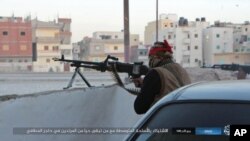Early this month, the Egyptian army launched a military campaign in the North Sinai and areas of the Nile Delta, all of which have seen major terrorist attacks in the past year. But experts say it will take more than security measures to eradicate terrorism in Egypt.
The military says it plans to clear the areas of militants, protect Egyptian society from the threats of terrorism and extremism, and address “other crimes affecting security and stability.”
That military plan might not be enough, according to Allison McManus, director of research at the Tahrir Institute for Middle East Policy in Washington.
“What has been lacking is a longer-term vision that would require not just the brute force, which at times as we have seen actually exacerbates the problem and caused greater antagonism among the local population, as well as the destruction of livelihood,” McManus said.
McManus thinks that military force must be supplemented with economic opportunities and good governance, which can make local populations partners in combating terrorism.
Increasing problem
In late November, President Abdel Fattah el-Sissi called on the military to use whatever force necessary to eliminate militant violence within three months.
Since 2013, terrorism has increasingly disrupted life in Egypt, especially in the Sinai. According to the Tahrir Institute, Egypt has suffered more than 1,700 attacks over the past four years.
In Sinai Province, the local Islamic State affiliate has claimed credit for about 800 attacks. And in recent months, the attacks have crept closer to Cairo and targeted more civilians.
The new military campaign began a few months after more than two dozen extremists carried out the deadliest terrorist attack in modern Egyptian history. The raid — which involved setting off bombs inside a Sufi mosque, then shooting from outside at worshippers as they fled — killed more than 300 people and injured scores more in the northern town of Bir al-Abed.
Almost 1,000 police officers and soldiers have been killed while fighting extremists and insurgents in the past four years.
Politically, there is widespread public support for the military campaign, although people are waiting to see if Sissi can deliver on his lofty promise of eradicating terrorism.
McManus says the timing of the campaign comes down to military and political factors.
“One, which would be a very positive thing, is that as opposed to previous campaigns, the military is gathering intelligence on the locations of terrorists, hideouts, training camps, et cetera," she said.
The second factor, she said, "is the upcoming presidential elections at the end of March. We have seen a pretty strong propaganda campaign showing the strength of the military in carrying out these operations; drumming up the political support for the campaign, which could be tied to build some support for Sissi in advance of the elections.”
While the campaign against militants is in its early stages, some experts are uncertain of how successful it might be.
Stick, no carrot
David Des Roches, a professor at the National Defense University in Washington, who previously served in Sinai, thinks it will be next to impossible to fully eradicate the terrorist threat.
“There has to be some elements of force; there are determined fighters here, but what you have in the Sinai is really more of an insurrection, and that requires a significant stabilization, reconstruction and civilian government efforts, as well. Unfortunately, I do not think we are seeing that, which is why this insurrection was harder to eradicate than the Egyptians thought it would be,” he said.
The Egyptian military has long operated with heavy force in North Sinai. It has been conducting regular air and land strikes, destroying fields and property to wipe out hideouts.
“The Egyptians will learn through a very hard experience that you have to have a carrot and a stick, and it seems that the effort in the Sinai is just the stick, and either one of these in isolation almost never succeed,” Des Roches said.
Des Roches said an over-reliance on military activity has antagonized local communities that are critical to intelligence gathering and appears to have led to further radicalization.
Bedouin in Sinai accuse government forces of indiscriminately bombing their villages as militants hide among the local population.
The U.S. State Department’s latest human-rights report expressed concern over the Egyptian government's “excessive use of force by security forces, deficiencies in due process, and the suppression of civil liberties.”
The Egyptian State Information Service says the government rejects allegations of excessive force. This week, the agency blamed the Muslim Brotherhood and its allies for the problems, and said some international media outlets propagate lies that civilians and their properties in Sinai have been harmed by the military.






